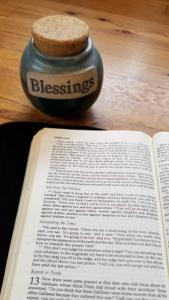What did God say to Ezekiel? In chapters 2 and 3, Ezekiel described a scene that has always been one of my favorites. (For that reason, and because I’m writing this at the beach, what should have been one post will be two shorter posts.) God called Ezekiel and gave him a scroll to eat. More specifically, God said,
“‘But you, son of man, listen to what I say to you. Do not rebel like that rebellious people; open your mouth and eat what I give you.’ Then I looked, and I saw a hand outstretched out to me. In it was a scroll” (Ezekiel 2:8-9).
Woven throughout Scripture is the concept we are to partake of God’s Word, or to eat it. When we partake of food, our bodies assimilate it and put it to use. What a perfect word picture of our response to reading God’s Word! 
*How would you describe this word picture, to “eat what [God] gives us?
*What does it mean to partake of God’s Word?
At the end of chapter 1, we left Ezekiel bowed in reverence before God, waiting to hear, listen, and obey what God had to say.
God said,
“stand up on your feet and I will speak to you” (Ezekiel 2:1).
“As he spoke, the Spirit came into me [Ezekiel] and raised me to my feet, and I heard him speaking to me” (Ezekiel 2:2).
- The Spirit enabled Ezekiel to hear God’s voice.
- As a prophet called by God, Ezekiel stood representing his people, the Israelites.
- Even though God proclaimed Israel rebellious.
- Jonah prayed to God regarding the Ninevites’ evil ways and acknowledged the truth that compassion and anger toward sin co-exist in our great God.
“I knew that you are a gracious and compassionate God, slow to anger and abounding in love, a God who relents from sending calamity” (Jonah 4:2).
*What does the co-existence of compassion and anger in God’s character mean for us?
God charged Ezekiel, “do not rebel like that rebellious people.”
He detailed their rebellion in contrast to Ezekiel’s role as a prophet.
“He said: ‘Son of man, I am sending you to the Israelites, to a rebellious nation that has rebelled against me; they and their ancestors have been in revolt against me to this very day. The people to whom I am sending you are obstinate and stubborn. Say to them, ‘This is what the Sovereign Lord says.’” (Ezekiel 2:3-4).
Consider God’s words to describe rebellion against Him.
- rebel, rebellious—their character1, a determined refusal to obey God’s law2
- revolt—specific sins and transgressions3
- obstinate—impudent, not showing respect, harsh, cruel, violent4
- stubborn—stiff-hearted, persistent5
- failure to listen
- briers—literally, a “nettle-like shrub with prickly leaves and … stickers,” a metaphor for the “bothersome, troublesome people of Israel.”6
- thorns—again, troublesome people7
- scorpions—used figuratively to describe “evil leaders among God’s people”8
These characteristics are part of their inner nature, at the center of their heart.9
The Sovereign Lord who says these things is Yahweh, the supreme authority.
*In contrast to what it means to rebel against God, how would it look to submit to God?
*Where and how does such change happen in our lives?
We are not called to Ezekiel’s prophetic role, but God’s charge in verse 8 has application for us.
- Listen to what God has to say.
- Do not rebel like the rebellious Israelites.
- Eat what God gives—the scroll of His Words that taste as sweet as honey to us.
*What are specific, practical ways we can apply this charge to our lives this week?
- Warren Baker, D.R.E., Eugene Carpenter, Ph.D. The Complete WordStudy Dictionary: Old Testament. (Chattanooga, TN: AMG Publishers, 2003), 666
- Ibid., 669
- Ibid., 926
- Ibid., 1019
- Ibid., 326
- Ibid., 790
- Ibid., 780
- Ibid., 865
- Ibid., 536
